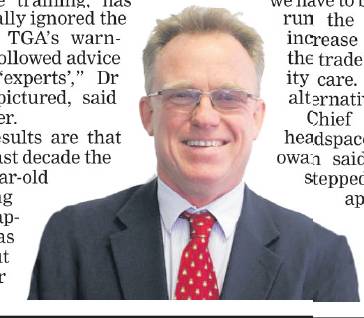'It's time to rethink kids , pills'
EXCLUSIVE
SARAH ISON
Australian youth are being
prescribed antidepressants at record rates, with increases of more than 40 per cent sparking a call for more scrutiny of a mental healthcare system that's "not working" in light of climbing suicide rates.
Figures from the Department of Human Services show the number of under 17-year-olds prescribed antidepressants in the five years up to 2017-18 soared from 69,973 to 101,174.
For those aged between 18 and 27, the figures rose from 253,607
to 328,870.
While the jump in prescriptions has been widely attributed
to the sheer growth in mental illness, critics including Dr Martin
Whitely, founder of health policy watchdog Psychwatch, have hit
out against the "failed approach" adopted by the mental healthcare sector, which he says has condoned the over-medication
of youth. In an open letter to the Morrison Government this week, Dr Whitely a retired WA Labor member and award-winning mental health researcher said
warnings issued by the Therapeutic Goods Association in 2004 and 2005 about the risks of antidepressants increasing suicidal thoughts in youth had long been played down and the consequences were now being felt.
"Over the last decade Australian psychiatric practice, much of which is conducted by GPs with little training, has substantially ignored the FDA and TGA's warnings and followed advice of local 'experts'," Dr Whitely, pictured, said in the letter.
"The results are that over the last decade the 0 to 27-year-old prescribing rate per capita has risen about 60 per cent, (while) 0 to 24-year-old per capita
suicide rates have risen 40
per cent."
Although conceding that "correlation does not prove causation", Dr Whitely said suicide and prescription rates would likely continue to rise without changes. He said greater scrutiny of advice provided by mental healthcare experts was needed.
A TGA spokesperson said statements regarding the use of
antidepressants in children were
published in 2004 and 2005
and warned about the risks associated with use in children and
adolescents.
Executive director of Orygen and founding board member of headspace Professor Patrick
McGorry said though he agreed greater scrutiny could improve patient outcomes, the association
made between increased antidepressant use and suicide rates
cations shouldn't be prematurely simply did "not hold up".
"I definitely agree these mediprescribed, but to rule them out is dangerous," he said. "Antidepressants don't increase suicide. Evidence shows there can
be a temporary increase in suicidal ideation ... (but) they reduce suicide risk in most." Professor Ian Hickie - the inaugural commissioner on Australia's National Mental Health Commission said quality of
care, rather than antidepressant
prescription rates, needed to be
the focus. "They (critics) are acting like there's something wrong with increasing treatment," he
said. "As treatment goes up,
we have to be careful, we do run the danger as we increase access ... that the trade-off is low-quality care. But what's the alternative? No care?"
Chief executive of
headspace Jason Trethowan said it followed a
stepped-care approach, where psychological support was
offered as the first line of
treatment.
